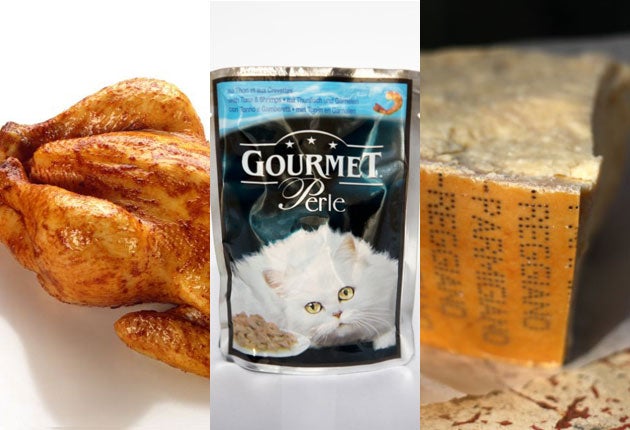The way we live now: what's in our baskets?
Changes in the inflation 'shopping basket' reveal a time-poor, throwaway society, reports Sean O'Grady

Your support helps us to tell the story
From reproductive rights to climate change to Big Tech, The Independent is on the ground when the story is developing. Whether it's investigating the financials of Elon Musk's pro-Trump PAC or producing our latest documentary, 'The A Word', which shines a light on the American women fighting for reproductive rights, we know how important it is to parse out the facts from the messaging.
At such a critical moment in US history, we need reporters on the ground. Your donation allows us to keep sending journalists to speak to both sides of the story.
The Independent is trusted by Americans across the entire political spectrum. And unlike many other quality news outlets, we choose not to lock Americans out of our reporting and analysis with paywalls. We believe quality journalism should be available to everyone, paid for by those who can afford it.
Your support makes all the difference.An image of the average Briton tucking into a hot rotisserie-cooked chicken bought from a supermarket, washed down with a glass of rosé and watching an internet-sourced DVD is conjured up by the Office for National Statistics (ONS) in its latest review of the nation's average "shopping basket", used to calculate the rate of inflation.
As ever, the list of the items entering and leaving the ONS index offers a revealing snapshot of the way we live: in come Freeview receivers, cat- food pouches, MP4 players, hardwood flooring and free-range eggs. Out go "party" bottles of cider, wine boxes, cans of cat food and MP3 players, some after relatively short careers.
Most of the 650 representative items in the ONS's inflation indices – such doughty symbols of the British way of life as a bag of compost, a full leg wax, squash court hire and pet insurance – remain an integral part of the index.
This year's changes suggest a Britain increasingly "time-poor" but wealthy enough to develop gradually more sophisticated tastes in food and drink. Thus the ONS has recognised the remarkable rise of the foil-wrapped whole cooked chicken, at the expense of its raw brethren, the latter perhaps a sign that, despite the efforts of Delia Smith, the British are beginning to forget how to roast a chicken – if they ever knew.
It is also an indication of the apparent attraction to many people of doing as much of their shopping as possible in one place, that is the big supermarket chains, at the expense even of more traditional fast food outlets as well as home cooking. Morrisons said yesterday that it sells "in excess" of 300,000 rotisserie chickens a week, up by about 5 per cent on last year.
The trend towards time-efficient internet shopping rather than the physical kind is also glimpsed in the substitution of web-based subscription services such as Love Film at the expense of the now-old-fashioned DVD (formerly VHS) rental store, rapidly disappearing from shopping parades. Blockbuster is one major chain moving towards internet services.
More sophisticated tastes are, arguably, reflected in the addition of free-range eggs, Parmesan cheese and the loss of the wine box, which only joined the index in 2006, ousted by the currently fashionable rosé. Imported cheddar cheese and imported lamb chops are also dropped this year. Britain's cats have seemingly also become even more fussy; cans of cat food have now been supplanted by pouches, with sales up by about a quarter on last year.
Technology, too, drives many of the changes: MP3 players, which only arrived in the basket three years ago, are now pushed out by the video-friendly MP4 player and the Blu-ray disc is now significant enough to make an appearance. Watch repair finally exits this year, as cheaper digital timepieces, usually not worth fixing, hasten our journey to becoming a "throwaway society".
The latest overhaul has also shown that spending in certain areas has changed dramatically with inflation, with households spending far more on fuel and light than in recent years. Conversely, expenditure on restaurants, hotels, clothing, footwear and motoring has shown a relative decline, according to the ONS.
Despite doubts in some quarters about its accuracy, the ONS collects about 120,000 prices every month for a "basket" of about 650 goods and services, in the most comprehensive survey of its kind. Changes in the prices of the items are used to compile the two main measures of inflation: the Consumer Prices Index – used as the Bank of England's inflation target – and the Retail Prices Index, which includes housing costs and is used to uprate many pensions and benefits.
Changes to the basket of goods and services this year are being introduced with the February 2009 price indices published today.
The inflation basket
2009 In
2009 Out
*Rotisserie whole-cooked chicken from supermarket
*Free-range eggs
*Parmesan cheese
*Rosé wine
*Hardwood flooring
*Blu-ray discs
*MP4 players
*DVD internet rental
*Pouches of cat food
*Wine boxes
n "Party" bottles of cider
*Imported cheddar cheese
*MP3 players
*DVD shop rental
*Tinned cat food
The way we were
*Mangle 1947-62
*Prunes 1947-74
*Single cream 1962-2009
*Dried mashed potato 1974-87
*VHS player 1987-2006
*Disposable razors 1991-2005
*Duvets, introduced 1987
*Take away "ethnic" meal 1990
*Tracksuit bottoms 1994
*University fees 2001
*Laptop computer 2005
*Smoothies 2008
Modern trends
Subscribe to Independent Premium to bookmark this article
Want to bookmark your favourite articles and stories to read or reference later? Start your Independent Premium subscription today.
Join our commenting forum
Join thought-provoking conversations, follow other Independent readers and see their replies
Comments